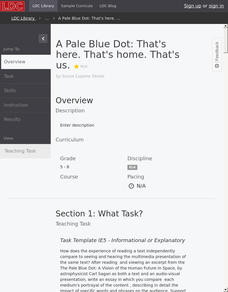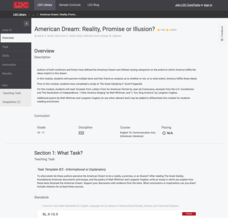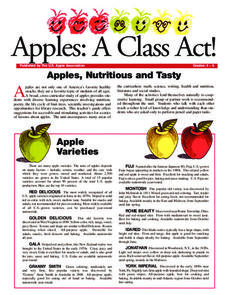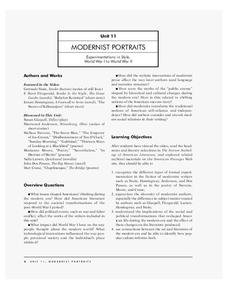PBS
Character vs. Society in The Invisible Man
Ralph Ellison's Invisible Man is difficult to read and difficult to teach. The novel is so highly regarded that it is one of most often listed as an option for the AP Literature and Composition exam. The materials in this packet from PBS...
Literacy Design Collaborative
A Pale Blue Dot: That's Here. That's Home. That's Us.
21st-century learners live in such a visual world that many are unused to letting their minds imagine the picture that words create. An excerpt from Carl Sagan's lecture, "The Pale Blue Dot: A Vision of the Human Future in Space,"...
IPA Productions
A Christmas Carol - The Story
Thirty-six pages familiarize scholars with the story and vocabulary of A Christmas Carol by Charles Dickens. After reading and listening to an abbreviated version of the holiday tale learners show what they know about the sequence of...
PBS
To Kill a Mockingbird Teacher's Guide
If you're planning a unit on To Kill a Mockingbird by Harper Lee, don't pass this resource by! It includes thorough discussion questions and vocabulary from the novel, research opportunities, and writing prompts to extend learning...
Literacy Design Collaborative
American Dream: Reality, Promise or Illusion?
Dream or nightmare? Class members craft a synthesis essay with textual to determine to what extent the United States has fulfilled the ideas embodied in the America Dream.
Benjamin Franklin Tercentenary
Franklin’s Fair Hand American Journalism
Scholars know him for his role in the American Revolution, but Ben Franklin was also a journalist and printer. Learners investigate his standards for what was fit to print using primary sources—including writings where Franklin explains...
The New York Times
Evaluating Sources in a ‘Post-Truth’ World: Ideas for Teaching and Learning about Fake News
The framers of the United States Constitution felt a free press was so essential to a democracy that they granted the press the protection it needed to hold the powerful to account in the First Amendment. Today, digital natives need to...
Los Angeles Unified School District
Why Is the Declaration of Independence Important?
Fair or unfair? To begin a study of the American Revolution, class members review the treatment of the people of the American Colonies by the King of England and decide which were fair and which were unfair. Class members then annotate a...
Robert Frost Farm
Socratic Seminar Format Overview
Whether new to the Socratic seminar format or an experienced veteran of the popular discussion technique, you'll find much to like in a five-page, richly detailed packet that not only details the prep necessary, the process, and the...
US Apple Association
Apples: A Class Act! (Grades 4–6)
Middle schoolers have a bushel of fun as they engage in activities and research core facts about apples. Packed with suggestions for in-class activities and out-of-class research, the colorful 6-page packet is sure to satisfy hungry...
Roald Dahl
Charlie and the Chocolate Factory
You can't read Roald Dahl's Charlie and the Chocolate Factory without craving the rich treats described in Dahl's vivid prose. Young writers try their hands at sensory language with a lesson plan that prompts them to write about their...
PBS
Martin Luther King Jr.: Civil Rights Leader
Expand class members' appreciation of the work of Dr. Martin Luther King, Jr. A powerful resource examines King's speeches, writings, and actions that reveal his deep commitment to a nonviolent approach to Civil Rights. Learners watch a...
PBS
Malcolm X: Minister and Civil Rights Activist
Any study of the leaders of the Civil Rights Movement would be incomplete without an examination of the life of Malcolm X. Class members view a short biographical video and analyze primary source documents to gain an understanding of the...
PBS
Muhammad Ali: Boxer and Civil Rights Activist
Many young people today know Muhammad Ali as the aging boxer who lit the torch at the 1996 Olympics. Introduce young historians to Ali the boxer, the Civil Rights activist, the war protestor, and the humanitarian with a powerful...
Stanford University
Observing Human Rights Day
How much intervention is appropriate for America to take in cases of human rights violations? Class members ponder a question that has lingered since the birth of America with a series of primary sources that reflect the degree to which...
Shakespeare Globe Trust
Twelfth Night
Whether you choose to include Twelfth Night in your course or whether Shakespeare's comedy has been thrust upon you, be not afraid to incorporate an interactive resource into your study of Shakespeare's tale of loss, love, and identity....
Rockefeller Archive Center
Understanding Mass Media News
In an age of fake news and photoshopped images, it is vital that 21st century learners development the skills they need to evaluate mass media and assess its validity. A great way to launch such a study is with a carefully crafted lesson...
Annenberg Foundation
The Search for Identity
Discover how writers express identity in their writing. Learners explore how issues of identity surface in the literature of minority writers. Scholars watch a video, read and discuss biographies, conduct research, engage in creative...
Annenberg Foundation
Poetry of Liberation
How do writers use words to protest injustice, challenge the status quo, and shape their own identities? Individuals watch and discuss a video, read author biographies, write poetry and journals, develop a slideshow, and complete a...
Annenberg Foundation
Becoming Visible
The television and interstate highways both came of age in 1950s America. Scholars use film, text, and discussion to explore how these and other cultural icons shaped the literature of the time. Pupils also create a family history...
Annenberg Foundation
Migrant Struggle
The American Dream is a goal that many pursue, but is it truly attainable for all people? An in-depth lesson explores the plight of migrants in twentieth-century America. The resource includes a video and author biographies and...
Annenberg Foundation
Modernist Portraits
How did literature reflect people's attitudes in post-World War I America? A lesson explores the topic using a variety of activities. Individuals watch and respond to a video; read author biographies and engage in discussion; write...
Annenberg Foundation
Rhythms in Poetry
Rhyme, rhythm, free verse, imagery: Do these words describe poetry, or jazz music? The answer is both! A resource explores these similarities as scholars watch a video, engage in discussion, read author biographies, write poetry and...
Annenberg Foundation
Social Realism
Many American writers in the late nineteenth century wanted their writing to reflect real life. Individuals watch and discuss a video, read and explore author biographies, write a journal entry and a poem, and complete a multimedia...

























